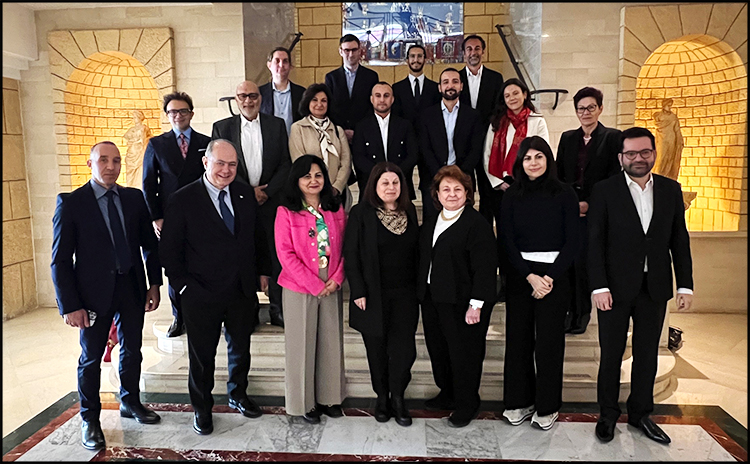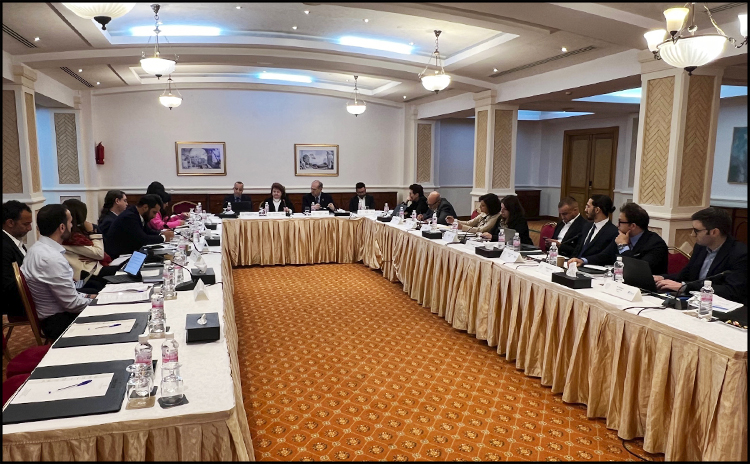NESA-AFRICOM-IEMed “Human Security Approach for the 2030 Workshop”
January 18, 2024 2024-01-18 16:10NESA-AFRICOM-IEMed “Human Security Approach for the 2030 Workshop”
NESA-AFRICOM-IEMed “Human Security Approach for the 2030 Workshop”
From 10-11 January 2024, the Near East South Asia (NESA) Center for Strategic Studies/Strategic Studies Network (SSN), in partnership with US Africa Command and the European Institute of the Mediterranean (IEMed), conducted the 10th annual workshop entitled “NESA (SSN)-AFRICOM-IEMed Human Security Approach for the 2030 Workshop,” in Tunis, Tunisia. Professor Anne Moisan and Fahad Malaikah from NESA, along with Ambassador Senén Florensa, President of the Executive Committee, Dr. Roger Albinyana, Managing Director, and Antoine Apprioual, Programme Manager from IEMed, led the effort. The prevalence of traditional security problems caused by internal weaknesses of the state, corruption, bad governance, migratory flows/internally displaced persons, and new/evolving forms of terrorism is posing new challenges throughout North Africa and the Sahel. Coupled with non-traditional threats caused by climate changes, social contract stressors, trafficking, and increased criminal enterprises threaten any semblance of stability. For years, international intervention and regional and transnational cooperation have made considerable efforts in the region, both in terms of resources and human lives. Aggravated by the challenges of international players and shifting lead/support countries, national and regional competition, and unresolved/unaddressed local grievances, terrorist groups seem to be gaining the upper hand. All these elements pose a direct threat to the well-being of people in the region and must be addressed by governments in their security calculus. The security situation continues to deteriorate with coups, civil conflicts, and democratization efforts apparently stalled. Most impacted are people in the region. By placing the focus on the impact on people, their specific needs and vulnerabilities, the human security approach recognizes the interactions between diverse social, economic, political, and environmental factors affecting the lives of people. It also calls for sustainable development and evolved security strategies that protect and empower people while building resilient societies. Consequently, not only will regional challenges be analyzed, but the focus will also be on comprehensive solutions and “people taking back their countries.” These solutions are aimed at protecting and freeing all peoples of the region from poverty, hunger, exclusion, violence, and disease, ensuring no one is left behind.

The event was attended by 20 NESA/SSN and IEMed Alumni and senior leaders from think tanks, research centers, and academia from nine countries in the region. The agenda and speaker selection are aimed at challenging regional partners’ traditional thinking while leveraging insights to better inform international policymakers on a broader range of sub-regional security issues. The workshop encourages new thinking, problem-solving, brainstorming ideas, best practices, and enhancing collaboration and cooperation among capable regional partners. The workshop provides an opportunity for participants to communicate and form professional security networks/relationships that can assist in enhancing long-term regional security and stability.

While the overall theme of the workshop was “Human Security Approach for the 2030,” specific sessions included: Top Security Problems in Today’s World; An Overview of Human Security; Economic, Social, Health Impacts on Human Security; Education and Resilience; Environmental Security; and concluded with Food Security. The workshop was also designed to encourage outside the official program a series of smaller off-side complementary meetings.
In 1994, the UN Development Program introduced a new concept of “human security,” equating security with people rather than territories, with development rather than arms. It examined both the national and global concerns of human security. Therefore, in the workshop, we were concerned with how people live in a society, how they exercise their choices, social opportunities, and whether they live in peace or conflict. In simple terms, human security is freedom from the threats of hunger, disease and repression, as well as protection from disruption in their lives.
Key takeaways:
- Regional powers must adapt to change at an ever-increasing rate
- Emphasis needs to be placed on deepening the “values” at the individual level, as well as at the national, regional, and international levels
- Culture, societal norms, and religious beliefs can no longer be used as excuses/reasons for not embracing the importance of universal human rights and human security.
- Multilateral organizations are only as good as its members and too often have failed to take constructive action to ensure peace evolving to nothing more than “talk shops.”
- Without political will, commitment, and ensuring national resources are applied, human security can never be achieved in society.







